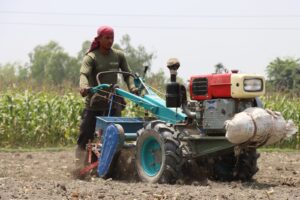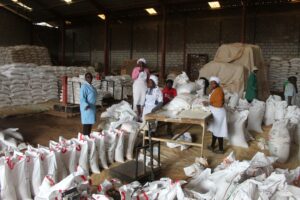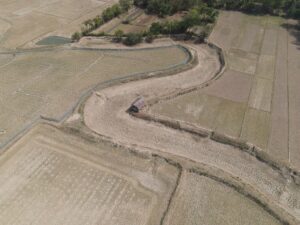Soil salinity is one of the most severe and common abiotic stresses affecting Africa’s rice productivity. To better present the current state and help future scientists better understand the challenges and focus their efforts toward developing salt-tolerant rice varieties, this study provides an overview of the various approaches, that can be employed to attain salt stress tolerance in rice.
Agriculture is the backbone of the African economy, which accounts for one-third of the Sub-Saharan African countries’ gross domestic product, employing about 65-70% of the African workforce.
However, the region lags behind others worldwide regarding agricultural productivity. This is due to several reasons that apply at different levels of the food value chain, making Africa a food-insecure continent.
A core problem with soils in Africa is degradation caused by escalating salinization, accelerated soil erosion, acidification, plant nutrient depletion, and soil biodiversity loss.
In most of the sub-Saharan African countries, land and soil degradation undermines efforts toward sustainable agricultural production and poses a major threat to the future of agriculture.
Soil salinity, among the causes of agricultural land degradation in Africa, is one of the most severe and common abiotic stresses affecting rice productivity.
There are several approaches for the management of salt-affected soils. However, one of the best approaches to overcoming salt stress problems in Africa could be through breeding crops with stress-tolerant genes so that they can be grown in salt-prone areas. Salt tolerance rice genotypes have been identified using conventional breeding and modern biotechnology approaches.
Furthermore, quantitative trait loci (QTLs) associated with salt stress tolerance have been mapped on different regions of the rice genome. The identified genes and genotypes are the potential donors in the development of new tolerant rice cultivars adapted to local environments.
Conventional breeding has been a successful method; however, the approach has been time-consuming as it requires many years to develop a new variety.
Biotechnology approaches are more advantageous, offer an improved alternative for transferring salt tolerance genes, and provide a rapid way to develop new tolerant rice cultivars that could help reduce the consequences caused by soil salinity effects in Africa.
Using modern breeding methods, the development of salt-tolerant rice varieties is guaranteed and ensures increased and sustainable agricultural productivity.
To address the problems the following can be taken into account for future study on salinity stress tolerance.
Plant stress tolerance is so complex, it is necessary to combine many approaches, including physiological, biochemical, soil, agronomical, and molecular methods, to attain salt stress tolerance.
Therefore, it is very crucial to expand the genetic diversity of rice genotypes used in breeding programs. This could involve exploring and incorporating genes from wild rice relatives or other salt-tolerant rice genotypes from different regions.
Through broadening the genetic diversity, breeders can access a wider range of traits and potential parental lines that serve as sources of salinity tolerance. It is projected for enhanced collaboration between national research institutes and international research institutes such as the Africa Rice Center and International Rice Research Institute for germplasm exchange, knowledge sharing, and conduct joint research work on improving salinity tolerance in rice.
The efforts could lead to the development of some new rice cultivars with enhanced salinity tolerance, and well adapted to the diverse agroecological conditions across Africa.
Also, breeding programs in Africa could deploy already proven technologies such as molecular markers and genomic selection to help accelerate the breeding process.
This could help the breeding programs to identify specific genes associated with salinity tolerance and individual plants possessing the tolerant genes for use in their local conditions.
Marker-assisted selection allows breeders to select plants with desired traits more efficiently, reducing the time and resources required for traditional breeding methods.
Another related technology is genomic selection using genomic data to predict the performance of rice plants. By analyzing the entire genome, breeders can identify markers associated with salinity tolerance and select plants with the highest potential for success. This approach can accelerate the breeding process and improve the accuracy of trait selection.
Moreover, considering the impact of climate change is essential, and breeding programs should focus on developing rice varieties that not only tolerate current salinity levels but also have the potential to adapt to future changes in climate and salinity conditions.
This can involve incorporating traits related to drought tolerance, heat tolerance, and resilience to other environmental stresses.
To maximize the productivity of crop plants under adverse conditions, there is an urgent need to look for sources of diverse genetic variation that can be used for developing new cultivars with greater yield potential and stability over seasons.
Salinity typically coexists with other environmental stresses, and it is hard to predict what will occur in the future, therefore, developing climate-resilient varieties that can withstand different abiotic stresses such as salinity, drought, and many others will provide a suitable solution.
This work was supported by Climate-Smart African Rice Research Project, DANI DA, Grant No. 19-3-KU.
Read the study
Mheni NT, Kilasi N, Quiloy FA, Heredia MC, Bilaro A, Meliyo J, Dixit S, and Msolla SN (2024) Breeding rice for salinity tolerance and salt-affected soils in Africa: a review. Cogent Food & Agriculture 10:1, 2327666.






